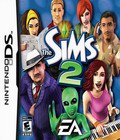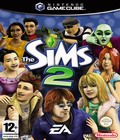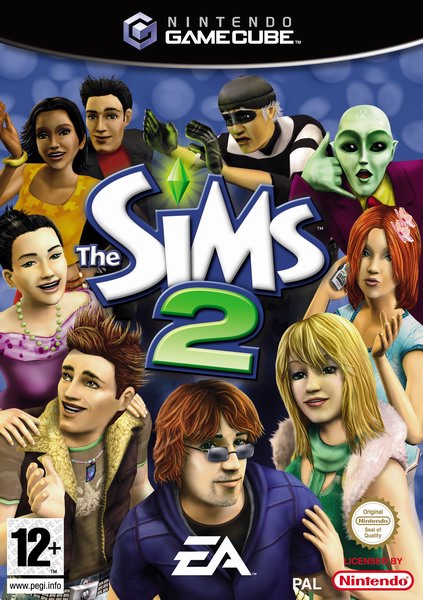Genre: Simulation
Publisher: EA
Developer: Maxis/EA
Release Date: October 24, 2005
Buy 'THE SIMS 2':
Xbox | GameCube | NDS | GBA | PC | PlayStation 2 | PSP
It would seem as though The Sims has been running forever, and the sequels numerous. It would seem that the series is ready to die, exhausted of every possible idea it could possibly contain, run into the ground by every singe retread and overdub churned out by Maxis and Electronic Arts.
But ... this is only the second one? The Sims 2? No. This can't be! We've seen these titles take up more rack space than you can shake a copy of Dynasty Warriors 5: Extreme Legends at! But, dear reader, it is true; The Sims, as ubiquitous — no, overbearing — as its presence may seem, we have only recently arrived at number two. There is a whole lot more sim-ing left for casual and hardcore gamers alike in the future. The Sims 2 is a trojan horse for add-ons, and these console versions are lead-ins for "point-five" sequels, as previously seen with Livin' Large and the retail bust (not to mention the butt of countless brainless marijuana jokes) that was The Urbz.
We've seen those crazy, babbling sims pee on floors, rock out to heavy metal music, fall in love, make love, lose jobs, ride bicycles, party, party even more, and a few other things I'm probably forgetting (wink). So, the first question any conscientious gamer should do before voting with his or her dollars is: "Mr. Electronic Arts, sir, what haven't you guys done with this game already?"
EA's answer would be a good one. "Why, we, with the help of our pals at Maxis, have given you a fleshed out, more realistic, simulation take on the life and times of your sims. They are now more social creatures than ever before, as they will remember each and every important interaction they have. And, more importantly, they can age, have children, and eventually die. The Sims 2 will now take players on an involved journey through generations of sims, and perhaps give them an introspective look at and hopeful respect for the family structure."
Of course, this answer is for the PC version.
Before I continue — Disclaimer: The Sims 2 on the Nintendo Gamecube console is a fun, involving game, and I enjoyed the time I spent with it.
That said, let's get down and dirty here: This game is not nearly as interesting as the PC version, and as good as it is, most of the reasons why The Sims 2 was such a leap over its predecessor have been skimmed over or completely removed here, all for the sake of condescending the game-playing prowess of the console market.
Never mind the fact that The Sims on PC is one of the most accepted computer games by casual players in the history of the medium.
The console version is instead padded with a number of solid additions which are enough to warrant a new version of the game, but perhaps not deserving of the number two in the title. Still, for a previous Sims fan, "solid additions" is more than enough to get them to swipe one of the add-ons/spin-offs off the shelves. My issue comes from this not being labeled as "Livin' Large 2," or a slight facsimile thereof.
The game begins, as always, with the ever-impressive character customization screen. A slew of hairstyles, clothing items, and skin-tone options are topped off by the ability to morph the actual structure of specific body parts to taste. While not a massive step forward for the series, this is among the best character customization seen on consoles, perhaps only to be topped by the forthcoming Phantasy Star Universe.
Next, players are faced with two crucial choices: the console friendly story mode, or the traditional, more PC-like freeplay mode. The choice breaks down to whether or not one has played the game before, as the story mode holds players' hands throughout the game, while freeplay is the more enriching, open-ended experience that made The Sims one of the best-selling videogames of all time. Story mode is not even a full narrative, per se, but a walkthrough with a definite end to the game. Freeplay allows for multiple sims to be created and has no set limits. (If I could nudge you any more than this to stay away from the story mode, I would.) Both modes contain the new console-friendly option to control the sims directly, third-person action game style, or through the traditional PC sims "point-and-click" system. Both have benefits, although I found myself sticking with the latter much more often.
Next, the sim's personality and aspirations can be outlined. Lazy sims, go-getters, they can all be created, but specific downfalls will always plague each type. Managing their personalities, along with bodily needs, ends up getting extremely difficult as time goes on. Once surmounting the incredible hump in the middle of the game, however, and getting used to the grind, the game becomes incredibly relaxing. It never gains a real sedate groove as in, say, Animal Crossing, but its balance between challenging moments and total monotony can be strangely hypnotizing.
The communication system is the main redone function. It's all about reading body language — the distance between sims (the closer, the better), hand motions, vocal tone, and, strangely enough, the hue of the background. During conversations, the background blurs, and different colors represent different conversational tones. The ultimate, most telling, pink, is a hard one to obtain, but as always, is the highest goal for all sim interactions. (Pink is for romance, silly!)
Looking at the history of Sims console titles reveals a spotty past, filled with bad CG/real-time combinations, unnecessary slowdown, and plain ol' low polygon counts. The Sims 2 repairs most of those issues, excepting the low-ish polygon counts, which can be somewhat forgiven when the robust character customization system is considered. The Sims 2 is stylish, bright, and no two sims ever look truly alike.
The sound design is as inventive as ever, continuing the Maxis tradition of infectious songs and solid sampling/synthesized sound design. While Sim City 2000 songs will probably never be topped by these guys, their current work is still astounding, especially with the glut of genres that need to be covered in an open-ended game such as this.
The Sims 2 for consoles is, well, a disappointment, but it's a solid, well-crafted disappointment. Fans will still like it; nobody will be angered by it. But, when looking at the great work done on the PC version, which has positioned itself on a very different path than the original (thanks to the generation hopping), there really isn't enough in this GameCube version to warrant a release past Livin' Large. Things are cleaned up, and this is the definitive console Sims experience, but I cannot help but stay firm that more of the new features from the PC version should have been retained. Steel Battalion was released for the Xbox, was it not? Perhaps more developers — especially condescending American PC publishers — need to realize that complexity on consoles is not necessarily a bad thing.
Score: 7.8/10
More articles about The Sims 2













 In The Sims 2, you direct your Sims over a lifetime and mix their genes from one generation to the next.
In The Sims 2, you direct your Sims over a lifetime and mix their genes from one generation to the next.


































